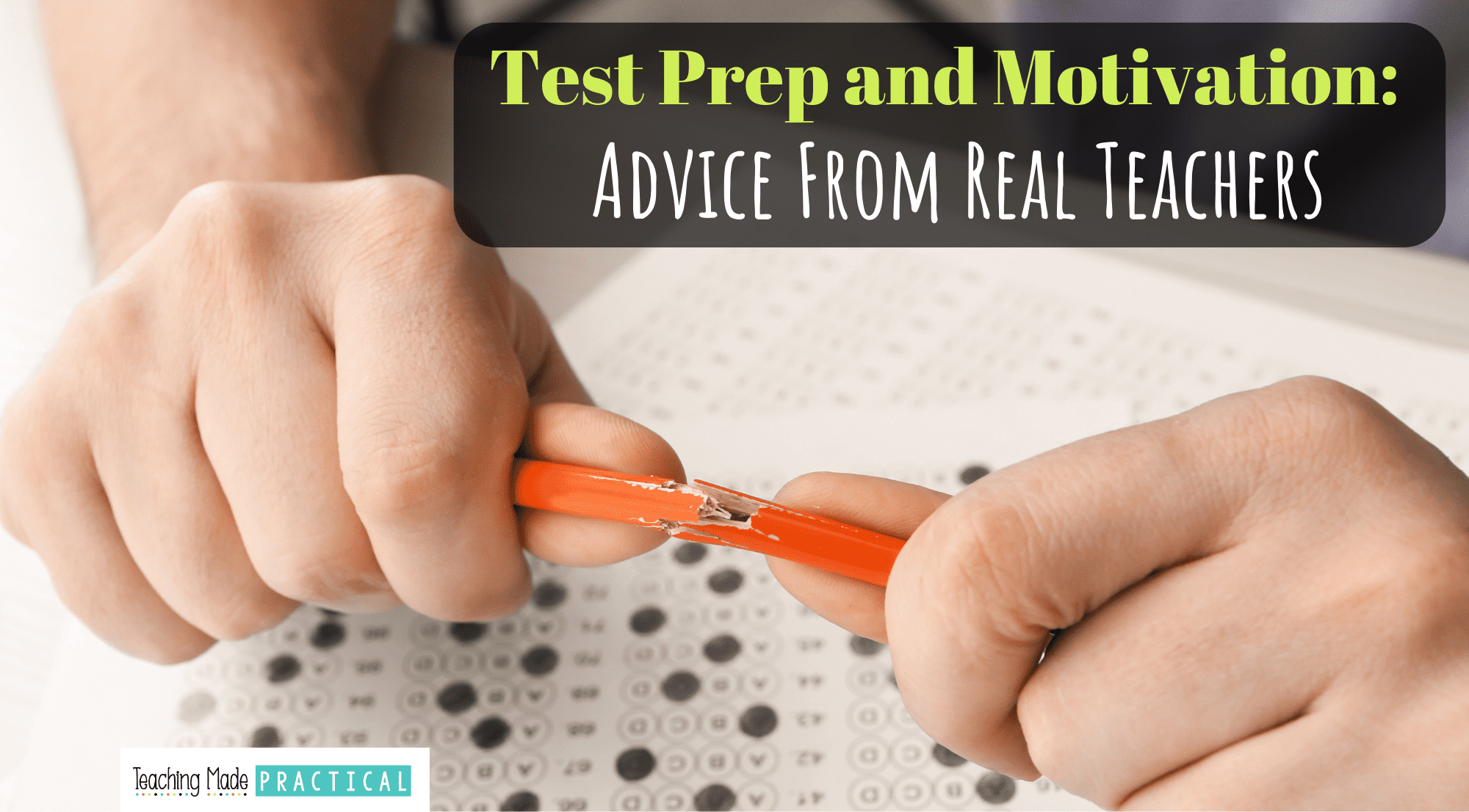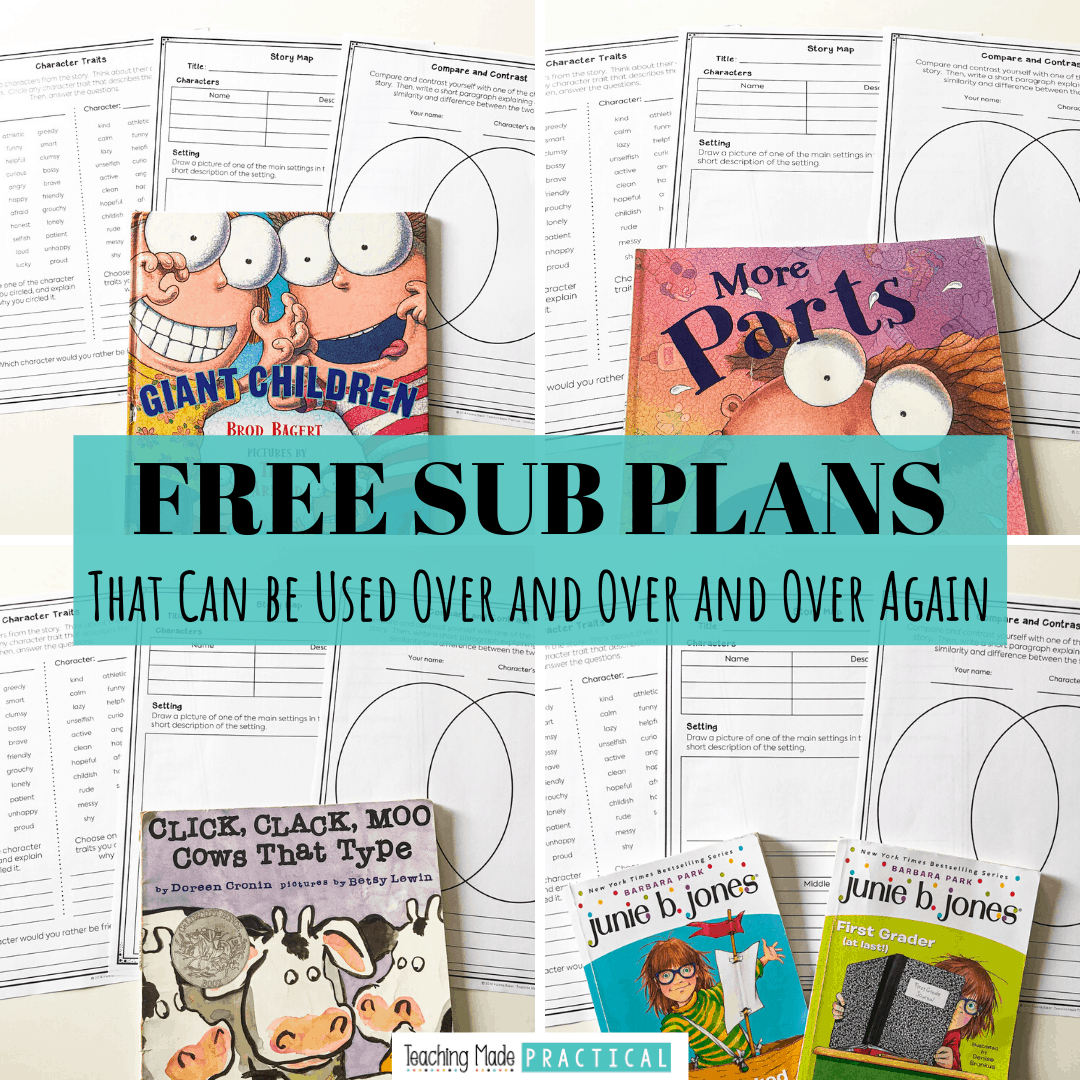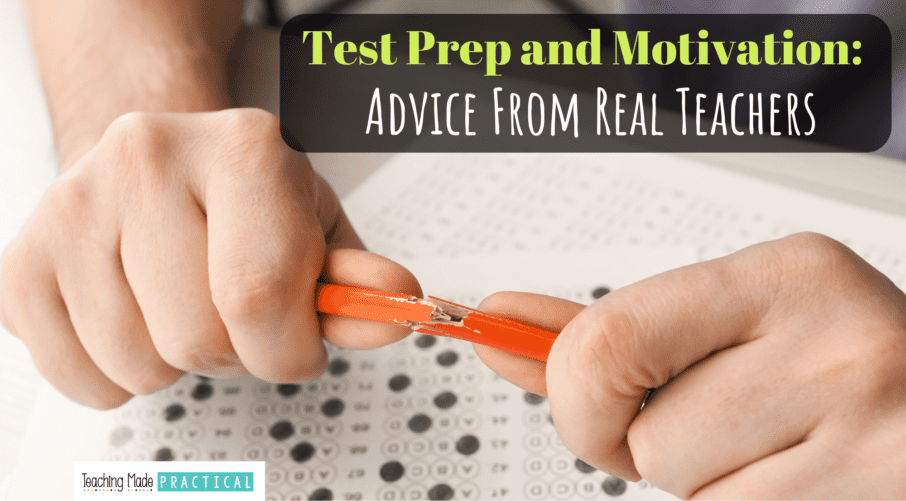
In this era of high stakes testing, preparing upper elementary students for state testing has become a necessity. Gone are the days where preparing students for a test simply meant meant teaching the content well.
For better or worse (and most teachers would probably agree it's for worse), test prep now includes everything from teaching test strategies, making sure kids get enough sleep and eat a healthy breakfast, motivating them to do their best work, and more.
After surveying over 800 teachers, I found that teachers emphasize the following different aspects of test prep for 3rd grade, 4th grade, and 5th grade students:
- preparing all year long (teaching content and test-taking strategies)
- reducing student stress
- reviewing in a fun and engaging way leading up to the test
- motivating students the week of/day of testing
- giving students a chance to relax and celebrate after testing is over
Below are some tips for each of these aspects of test prep from real teachers.
Sometimes I recommend products using affiliate links. If you click through and buy, I may be compensated at no cost to you.
Don't Cram - Prepare for State Testing All Year
Test prep really happens all year long. Anytime you are covering standards based skills (like main idea, text features, comparing and contrasting, character traits, summarizing, theme, constructed response, rounding, fact and opinion, decoding multisyllabic words, etc.), you are preparing your students for state testing.
Some of the teachers surveyed were adamant about not teaching to the test, while others believed that test-taking strategies should be taught in order for students to be as successful as possible.
Below, real teachers give tips for preparing for testing season throughout the school year.
- "We just make sure to review any topics that we covered earlier in the year and trust them to put what they've learned into practice!"
- "I did practice problems and testing strategies (how to use scratch paper, how to find key words, what to underline and circle, how to cross answers out) during my small group times to give them tools instead of becoming so overwhelmed."
- "Each Monday, we do "Article of the Week." B/c there is so much focus on non-fiction and pulling evidence from the text, it is important to me that we make non-fiction texts a regular part of class time. I try to use a wide variety of topics. For example, one week the article might deal with science, the next week it may be about music, the next week financial literacy, the next current events or happenings around our hometown, and so on. There is a large population of ELL's in our school this year, so I like to also make sure one of the readings each month includes info about celebrations, geography, traditions, or some other cultural aspect of their heritage countries - I make sure to ask if they are okay with that before following through. Not only does it help everyone learn more about the world and each other, but it also helps my ELL's feel equally important and included. It also allows them to take the lead in our class conversations with confidence. I like to make sure that some of our weekly articles also include maps, graphs, and/or data to analyze b/c state tests include it all! My hope is that this variety and consistency make it easier for my students when they are asked to complete similar tasks on the state tests. Fingers crossed! :-)"
- "I despise state testing and refuse to waste my time on it, so when we are testing, I put a positive quote on each of their desks each morning." Karan Ricci, Grade 5
- "We use visualization techniques as one form of motivation. (Picture the anchor charts we've used, picture yourself reading the questions carefully, and answering with evidence)."
- "We do practice tests on the computer to provide familiarity with the program and the tools. We take most of our reading assessments on the computers and use a typing program to help students become more proficient typists. We give away tickets for students that show active test-taking strategies like reading the question first, finding evidence in the text, making a graphic organizer for writing, and using an appropriate amount of time for finishing an assignment. These tickets are then entered into a drawing for tickets to different events/activities like the zoo, a professional baseball game, a game card for Dave & Buster's, etc."
Tips to Reduce Test Taking Stress
Sadly, high stakes testing in the US is associated with anxiety and stress in both students and teachers. Many of the teachers surveyed emphasized the importance of reducing stress as much as possible for their 3rd, 4th, and 5th grade students. (Brain breaks always help!)
Some teachers taught mini-lessons on growth mindset and how to deal with anxiety - useful skills not just for testing, but for life.
Others read picture books like Testing Miss Malarkey and The Anti-Test Anxiety Society.
Many teachers help their students set personal goals that focus more on effort, trying your best, and taking your time rather than focusing on the actual outcome of the test.
Below, teachers give tips for reducing test-taking anxiety in students:
- We are a 7 Habits school, and filled with many ways in which to reach the kids and hold them accountable. I am HUGE on building manners, self esteem, ownership of oneself and choices, and being the best person you can. That helps during testing, because they are used to hearing me tell them that they can do it, I believe in them, and they have no barriers except their own doubt…Best yet, I work hard to instill in them that they are worth it, and they deserve to do well and be recognized.
- "We do Tabata exercises each morning before testing to get their blood flowing, students get a daily motivational keychain, and students also get to chew gum to help them focus." Andrea - Grade 4
- "I am constantly talking with my students and leading by example how to be positive and have a growth mindset. Letting them know that mistakes are ok and a growth opportunity, hopefully reduces anxiety and nerves. Also, I find that my students need the chance to repeat, repeat, repeat."
- "We make ourselves into superheroes and hang them around the room to motivate us."
- "We do a mantra every morning before testing: I am smart, I am capable, I will do my best! To prep them beforehand, we do lots of positive framing discussions about how the testing is their way to show off what they have learned."
- "In my class we cheer each other on throughout the year - when someone is "stuck" you will hear them say "you've got this," or "you rock." So around my room I have positive, encouraging quotes up for them to look at while testing." Michelle Money, 3rd grade
- "I tell my students, 'You only know what you know. Stressing about the test is going to make you forget some of the things you already know. Do your best. We can work on what you didn't know.'"
- "I try not to put too much stress on my students for their state testing. I think when I stay relaxed about it, it helps them stay relaxed. I believe that by building relationships with my students and by helping them be the best little people they can be, the testing motivation takes care of itself."
Teaching students to be kind to each other all year long will benefit you during the stressful test season!
Play Fun Review Games
Testing is boring - for students and for teachers. But preparing for the test doesn't have to be! The teachers surveyed used all sorts of review games and activities to make preparing for the test a positive experience instead of a negative one.
The teachers surveyed used things like Kahoot, task cards, trashketball, Escape Games, and more to make reviewing for the test more fun. You can read more about the suggested games and activities here.
Tips for Motivating Students During Testing Season
One of my biggest frustrations around testing was kids that did not do their best work. This reflected poorly on both me and the student, and it was not an accurate reflection of either of us. Obviously, telling students how important the testing was and stressing them out is not the best option. Instead, it is better to motivate students and make them excited to do their best work.
There are so many different ways to do this, and the teachers surveyed had some great ideas!
The most popular idea was to give the test-takers motivational notes written by parents, teachers, administrators, and other students. One teacher mentioned that, instead of notes, she would take pictures of teachers holding up encouraging signs and show them to her students. Another teacher would collect notecards with notes from different people and put it on a ring. They called it their "championship ring."
In some schools, EVERYBODY gets involved, even students and teachers that are not required to participate in state testing. They decorate the school and hold pep rallies to cheer the students on.
Many teachers talked about providing breakfast for their students every day during testing. This got the upper elementary students excited and helped every student get a healthy breakfast. For teachers at low-income schools, this can be particularly important.
Here are some more great ideas from teachers all over:
- "We host a "Spring Training" baseball themed motivational month of preparation before the test. Students earn their way around the bases for attendance, positive attitude, giving their best, completing quick review at home." Brenda Peters - Grade 3
- "Motivation week. Sock it to the test and they wear socks to school. Shine on the test and they wear sunglasses, etc." Tina Martinez
- "We do some exercises to pump us up. Then they go around and give 10 other students a positive comment as well as telling them they can do this! We end with a “power pose” to send positive energy and confidence into ourselves."
- "Walk the Red Carpet. Make it a dress up day and treat it like the Oscars." Michele Stewart 4th grade
- "Not a lot of prep, it's high stakes enough without me adding extra hype. Always make sure they have breakfast, though, and lots of mints to help stay alert!"
- "We have a big rally and watch funny you tube videos. We wear sweats or pajamas so we are super comfy."
- "I have them pick an inspirational person and then I write a quote for each of them from the perspective of that person that encourages them to do their best."
- "We have motivational chants and songs that we sing prior to testing. I also hand out motivational erasers with the quote “mistakes are proof that you are trying” to relieve stress from students. We also take physical activity breaks and deep breathing techniques to help release some pent up energy before testing."
Decompress After State Testing
Testing, especially the high stakes testing in the United States, is extremely draining for students. Many of the teachers surveyed emphasized the importance of giving students time to decompress and celebrate after testing. This can be done a lot of different ways, including the following tips:
- extra recess time
- having a game day with some of these strategy games
- listening to a fun read aloud while coloring or resting (find some popular read alouds for upper elementary here)
- going on a field trip
- completing a team building activity
- having an ice cream party
- throwing water on teachers/principals
- doing a fun STEM challenge
- Makerspace (find out more here)
Once testing is over, it can be hard to keep students motivated and learning as they start to think about the end of the year. Find some ways to Keep Students Learning After Testing is Over here.
You might also like these ideas and Activities to Help Prepare Students for Standardized Testing
Never Stress Over Sub Plans Again!

Make copies, find a fiction book, and you'll be ready for any emergency that comes your way!





